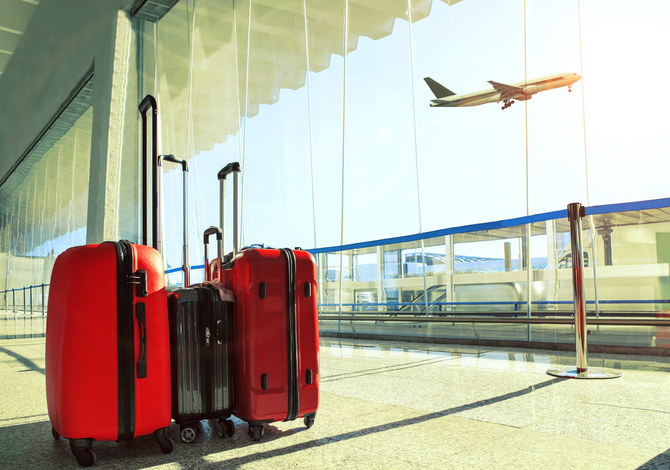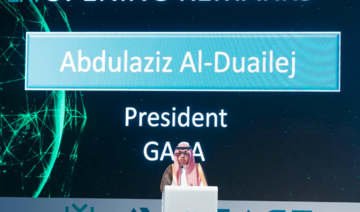RIYADH: With marquee football signings and a shake-up of the international golf tour, Saudi Arabia is making waves in the sporting world at an unprecedented rate.
Yet it is not just on the pitch or the green where the Kingdom is looking to become a global leader, it is on the console screen.
In September 2022, the Saudi sovereign wealth fund earmarked nearly $40 billion for a new conglomerate aimed at transforming the Kingdom into a global hub for games and esports by 2030 — and the move is already starting to pay off.
According to Vlad Belyanin, co-founder of True Gamers, a worldwide network of esports clubs that is launching in the Kingdom in early September, “everyone in the industry is looking at Saudi Arabia.”
Speaking to Arab News, he said: “After Ronaldo’s move to Al-Nasr and Al-Hilals €600 million ($662.06 million) offer to Lionel Messi we can expect Saudi Arabia to increase the integration of esports elements into traditional sports.
“I do not exclude that someone will assemble the best mixed team in the world, taking notable esports and traditional sports players.”

The Middle East is a key player in the global gaming industry, with an impressive penetration rate and a strong commitment from governments to invest in the sector.
Alexander Schudey, managing director and partner at BCG
The investment by Saudi Arabia’s Public Investment Fund is part of the Kingdom’s Saudi National Gaming and Esports Strategy aimed at increasing the quality of life for egamers by improving players’ experience, providing new entertainment opportunities, and achieving an economic impact by contributing around SR50 billion ($13.33 billion) to the Kingdom’s gross domestic product by 2030.
The strategy is expected to lead to the creation of 39,000 new job opportunities by 2030.
Over $3 billion was invested in the industry by PIF last year, as part of the $38 billion commitment to be used by its company Savvy Games Group.
About a third of the announced amount will be spent on the purchase of a major game publisher, and the remaining funds will be used to acquire minority stakes in other gaming companies.
Acquisitions so far have included ESL and FACEIT for $1.5 billion in January 2022, Embracer Group for $1 billion in June 2022; VSPO for $265 million in March 2023, as well as Scopely for $4.9 billion in April 2023.
Brian Ward, CEO of Savvy Games Group told Arab News how the acquisition and merger of ESL FACEIT Group has enabled the creation of a force able to set the gold standard for esports competitions and gaming industry events.

Saudi Arabia is attracting worldwide attention in the sector through its investments and acquisitions in cybersports. (Supplied)
“Saudi Arabia is very important for Savvy,” Ward said, adding: “It is a very exciting and rapidly growing market — the 19th biggest market globally. There are over 21 million gamers in KSA, 70 percent of the population — over 40 percent of whom are women.”
Ward stressed how Savvy’s aim is to make Saudi a global gaming hub. The company intends to do this by building capabilities and leading international and local gaming investments.
“We believe Savvy will have a significant beneficial economic impact in Saudi Arabia, both through its direct and indirect contribution to GDP, job creation and skills development,” he added.
The growth in esport is not confined to Saudi Arabia or the Middle East. Last year PwC predicted that in 2026 the global gaming industry would be a $320-billion industry, twice as much as in 2019.
Yet despite its global size, the Middle East is being seen as one of the hotspots for this growing industry.
According to a report from Boston Consulting Group released in June, more than 60 percent of the Middle East population are gaming enthusiasts, resulting in one of the highest shares of gaming mobile app downloads — 50 percent compared to the global average of 40 percent.
“The Middle East is a key player in the global gaming industry, with an impressive penetration rate and a strong commitment from governments to invest in the sector,” Alexander Schudey, managing director and partner at BCG in a statement.

Record investments are generating high expectations. Entrepreneurs who want to make money are now thinking about entering the Saudi-Arabian market.
Vlad Belyanin, co-founder of True Gamers
He added: “The region’s focus on gaming and the establishment of dedicated gaming hubs makes it an attractive destination for global gaming companies.
“The young and digitally savvy population, particularly in Saudi Arabia, where 70 percent of the population is below the age of 30, combined with higher disposable incomes and a preference for indoor activities due to the hot weather, further contribute to the region’s thriving gaming ecosystem.”
BCG’s latest report identified four major trends that will likely leave the biggest impact on the industry’s future.
These include audience growth and demographic shifts, whereby the gaming industry growth is broadening its demographic reach, appealing not just to Gen Y, who grew up playing video games, but also those entering their 30s, with an average gamer age of 31.
Another trend is innovation from players, with consumer communities playing a significant role in driving change in the industry, while mergers and acquisitions activity is leading the gaming industry to witness a surge in consolidation as major publishers, media companies and technology firms purchase studios and gaming-related assets globally.
FAST FACTS
• Saudi Arabia’s National Gaming and Esports Strategy aims to contribute $13 billion to the Kingdom’s gross domestic product by 2030.
• PwC predicts that in 2026 the global gaming industry will be a $320-billion industry.
The final trend identified by the BCG report is new use cases, whereby the gaming industry is witnessing the emergence of the metaverse as a concept that is revolutionizing digital experiences.
The Kingdom is quickly becoming a global hub for gaming through investment and the launch of new products and technologies reflective of the above trends.
It is not just participants driving the growth of the sector, but those who wish to watch esports.
According to the Consumer Technology Association, the audience for cybersports will be 519 million viewers by 2024.
Technology and innovation play a major role in the esports industry and entrepreneurs, especially in Saudi Arabia, are capitalizing on these advancements to spur growth in the sector.

We believe Savvy will have a significant beneficial economic impact in Saudi Arabia, both through its direct and indirect contribution to GDP, job creation and skills development.
Brian Ward, CEO of Savvy Games Group
“Cybersport is becoming an experimentation ground for artificial intelligence, chips, visualization, and big data technologies,” Belyanin told Arab News.
He added: “Games are becoming more accessible. The growing popularity of games on smartphones and tablets compared to PC gaming systems is driving game makers to release games on different platforms.
“Cross-platform and cloud-based gaming solutions promote hardware-independent games, and artificial intelligence ensures fair gameplay. Social gaming and cyber sports provide a platform for developers and players to build healthy gaming communities and improve brand reach.”
Sponsoring and hosting esports events and competitions further allows developers to build brand awareness and attract new players, he states, noting how True Gamers is developing and implementing new technologies in the user experience at its cybersports centers.
For example, True Gamers is the first in the world to use robotic dogs as waiters in clubs. Three mechanical assistants will appear in different clubs in Dubai, and by the end of 2024 their number will increase to around 20. Production of the test technology cost $100k, as well as an average $10k a month on updates and modifications of robots.
Saudi Arabia, stresses Belyanin, is attracting worldwide attention in the sector through its investments and acquisitions in cybersports.
“Record investments are generating high expectations,” he adds. “Entrepreneurs who want to make money are now thinking about entering the Saudi-Arabian market.
“They are thinking: ‘There is a lot of investment, so there is a lot of profit, and therefore I need to enter the market.’”
Belyanin added: “My point of view is different. If there are a lot of investments, the new gaming culture starts to grow there and therefore, it is interesting to work with it.
“This is huge long-term work, which will bring much more than a quick profit. We are not afraid of large-scale tasks; we are keen to create the future of gaming with our own hands.”






















